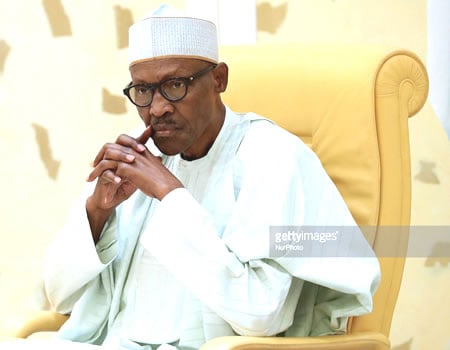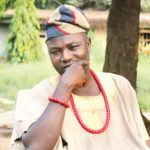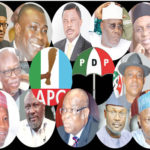
Deputy Editor, LEON USIGBE, here presents a chronological review of some significant events that dogged President Muhammadu Buhari in 2017.
1992 is not a year on which I shall look back with undiluted pleasure. In the words of one of my more sympathetic correspondents, it has turned out to be an annus horribilis.” The words of Queen Elizabeth to England after a year of series of unpleasant events that had profound impact on her monarchy. During a speech marking the 40th anniversary of her ascension, she used the Latin Phrase which means “horrible year,” to describe the Royal Family’s experiences during the year that included the loss of Mauritius, her last kingdom in Africa, which was proclaimed a republic; the divorce of her second son Prince Andrew from his wife, Sarah, the Duchess of York; the divorce of her daughter, Anne, Princess Royal from her marriage to Captain Mark Phillips; the publishing by Diana, Princess of Wales of a tell-all book Diana: Her True Story, which revealed the troubles in her marriage with Charles, Prince of Wales; the emergence of scandalous pictures of the Duchess of York being kissed on her feet by her friend, John Bryan and other unpalatable incidents capped by Prime Minister John Major’s announcement to the House of Commons that Prince and Princess of Wales had decided to separate.
Like the Queen in 1992, President Muhammadu Buhari described the year 2017 as “a tough year,” possibly his annus horribilis. He may have been referring to the economic condition of Nigerians which he hopes will improve in 2018 but on a personal level, 2017 was a year he would rather forget quickly because of the series of unpleasant events he experienced that would have been sufficient to break his resolve.
The year welcomed him with wanton killings in Southern Kaduna on which he had to order a decisive action to bring under control. Just as he was scratching his head trying to devise a permanent solution, the news hit him of his Chief of Staff, Abba Kyari, using the funds of the Nigeria High Commission in London to pay his own medical bills during one of his visits for emergency medical treatment. The presidency sternly denied this as “totally incorrect, misleading and a fabrication.” This was soon followed by the embarrassing news of the Nigerian Air Force wrongly bombing Rann’s Internally Displaced Persons (IDPs) community in Borno state leaving dozens of innocent persons dead. The presidency expressed regret over the incident.
On January 18, the regular meeting of the Federal Executive Council (FEC) failed to hold with no reason offered by the Presidency. But the following day, the president left Abuja for the United Kingdom in what the presidency explained was part of his annual leave. But it did say that the President would also undergo routine medical check-ups and had handed over “functions of the Office of the President” to Vice President Yemi Osinbajo. Speculation swirled though that he was admitted in a London hospital while some even suggested that he had passed on. The presidency again intervened, dismissing the rumour in its entirety as Special Adviser to the president on media and publicity, Femi Adesina, flatly said: ‘‘The President is in London on vacation. He is not in any hospital and he is not ill.”
In an apparent move to back up this claim, the presidency published photographs of the president and his wife, Aisha, taken in a room at an unnamed location in the U.K. In the meantime ,Osinbajo set off the performance of his executive duties with the swearing in of new National Population Commission (NPC) commissioners. But as he was out in London, Buhari’s imprimatur remained at the presidential villa, Abuja where soldiers who had been providing him with close body protection were disengaged and replaced with personnel of the Department of State Services (DSS) just as it was in previous dispensations.
While on the medical vacation in London, Buhari also spoke on phone with his United States counterpart, Donald Trump, congratulating him on his election as President of the United States, and on his cabinet. He also got assurances of the military that they remained loyal to him even as he was away from the country. Service chiefs conveyed this loyalty to him when, along with the Minister of Defence, Masur Dan-Ali, they met with Osinbajo to brief him on the security situation in the country. It was the minister who made the pledge on behalf of the military.
The president extended his medical vacation and returned on March 10 but did not resume work immediately. On his return, he put a lie to all the claims made by Osinbajo and other members of government that he had been hale and hearty all along when he announced to the world that he had never been that sick in his life. He revealed that he even had blood transfusion over his still undisclosed ailment to dramatise its seriousness.
When he eventually started work, one of his first significant action was to approve the immediate release of the second tranche of the London-Paris Club refunds to the states to ease their financial hardship. The President gave the directive while addressing the meeting of the National Economic Council made up of State Governors and chaired by the Vice-President. “I will not rest until I address those issues that affect our people. One of these basic things is the issue of salaries. It is most important that workers are able to feed their families, pay rent and school fees. Then, other things can follow,” he said.
In April, he ordered the suspension of the Secretary by Government of the Federation (SGF), David Babachir Lawal and the Director General of the National Intelligence Agency (NIA). Ambassador Ayo Oke and directed that a full scale investigation be launched into their activities. Lawal’s suspension was in connection with contracts under the Presidential Initiative on the North East (PINE) while that of Oke was in connection with the stash of currencies discovered by the Economic and Financial Crimes Commission (EFCC) at a flat on Osborne Road in Lagos. The president raised a three-man committee headed by Osinbajo to investigate the suspended officials. Action was never taken on its report.
Buhari missed FEC again and it soon emerged that he would work from home to enable him to have enough rest as he recuperated from his long-term illness. It was the Minister of Information and Culture, Lai Mohammed, who broke this news to State House correspondents after the FEC meeting which the president was unable to attend. “And he will be working from home. He has asked all his files to be taken to him in the house. He will be working from home today,” Mohammed stated.
The presidency later confirmed that even though Buhari had survived the worst in London, he would not able to work full time, saying that his doctors had insisted he should rest.
In May, the president returned to the U.K. for medical treatment for what the presidency said was a “follow-up medical consultation with his doctors” and Vice President Osinbajo was to act as president in his absence and, in the exercise of the presidential authorities, Osinbajo signed three executive orders that government believed would significantly change some of the ways government business and operations are conducted in the country. He followed this up with a nationwide radio and television broadcast to mark the second anniversary of the administration when he highlighted the achievements of government and reassured citizens of a more prosperous future. Osinbajo also signed two bills into law including the Secured Transactions in Movable Assets Act, 2017 (otherwise known as Collateral Registry Act) and the Credit Reporting Act, 2017.
Buhari’s i’ll-health continued to stir controversy with some observers expressing fear about a possible constitutional crisis akin to the type witnessed under late President Umaru Musa Yar.Adua. But the presidency rejected this insinuation as it saw no basis for comparison.
After one more trip to to the U.K. to see her ailing husband, Aisha returned to announce that Buhari was recuperating fast and had thanked acting President Osinbajo for his loyalty and on June 12, the acting president who was thought to be still teleguided by Buhari or members of his alleged cabal, signed the 2017 Appropriation Bill in law after ostensibly securing Buhari’s nod. Osinbajo also had to deal with mounting agitations in different parts of the country with the Indigenous Peoples of Biafra (IPOB) revving up its demand for referendum and threatening to disrupt the impending Anambra State gubernatorial election on the one hand and disparate Arewa groups issuing a quit notice to all Igbos living in the North on the other.
In July, Osinbajo made a one-day visit to the recuperating Buhari in London amidst renewed killings in Southern Kaduna. He returned from the London trip to swear in two ministers, Stephen Ocheni and Suleiman Hassan from Kogi and Gombe states, respectively, who could not be inaugurated for months because of the president’s condition. Protest led by Charlie Boy, mounted against Buhari’s continued absence from the country and in London, some Nigerians organized vigils at Abuja House where the president was accommodated and in about 48 hours after the London protest commenced, President Buhari vacated Abuja House, London and returned to Abuja. However, the Presidency denied that the Charlie Boy’s “Return or Resign” protest forced Buhari to return prematurely to the country after 105 days sojourn in the U.K.
His administration was also dogged throughout the year by the menace of Fulani herdsmen who attacked communities in various parts of the country with the president seemingly quiet on their activities. When he eventually spoke on it towards the end of the year after the killing of at least 20 people in Plateau State, he told the rampaging herdsmen that their “madness” had gone too far. He therefore instructed the military and the police to not only bring the violence to an instant end, but to draw up a plan to ensure that there were no further attacks and reprisal attacks by one group against the other.
President Buhari also had to contend with allegations of corrupt practices and the apparent unwillingness of his government to hold members of his party accountable for their corrupt acts as well as the illegal reinstatement to office and promotion of former Chairman of the Presidential Task Force on Pension, Abdulraheed Maina. This led to a public spat between the Head of Service (HoS) of the Federation, Mrs. Winifred Oyo-Ita and the Chief of Staff to the President, Kyari.
Crippling fuel scarcity ensured that the year ended with even more bitterness and this was compounded by National Bureau of Statistics (NBS) figures which indicated that millions of Nigerians had lost their jobs. Even more worrying for the president on a personal level was the involvement in a power bike accident of his only son, Yusuf, who sustained head injuries and multiple fractures to his limbs.
But on a more positive note, Buhari welcomed the exit of Nigeria’s economy from recession after about two years in the doldrums. There were new Gross Domestic Products (GDP) figures indicating marginal growth in the economy as well as increase in agriculture production especially rice.
As the year 2018 rolls in, President Buhari would be hoping that all his vision for Nigeria will begin to manifest, that his long-touted killing of corruption, restructuring of the economy, improved infrastructure and security will become visible for all to see and enjoy and perhaps erase the memory of a year which he himself described as tough.
WATCH TOP VIDEOS FROM NIGERIAN TRIBUNE TV
- Let’s Talk About SELF-AWARENESS
- Is Your Confidence Mistaken for Pride? Let’s talk about it
- Is Etiquette About Perfection…Or Just Not Being Rude?
- Top Psychologist Reveal 3 Signs You’re Struggling With Imposter Syndrome
- Do You Pick Up Work-Related Calls at Midnight or Never? Let’s Talk About Boundaries





